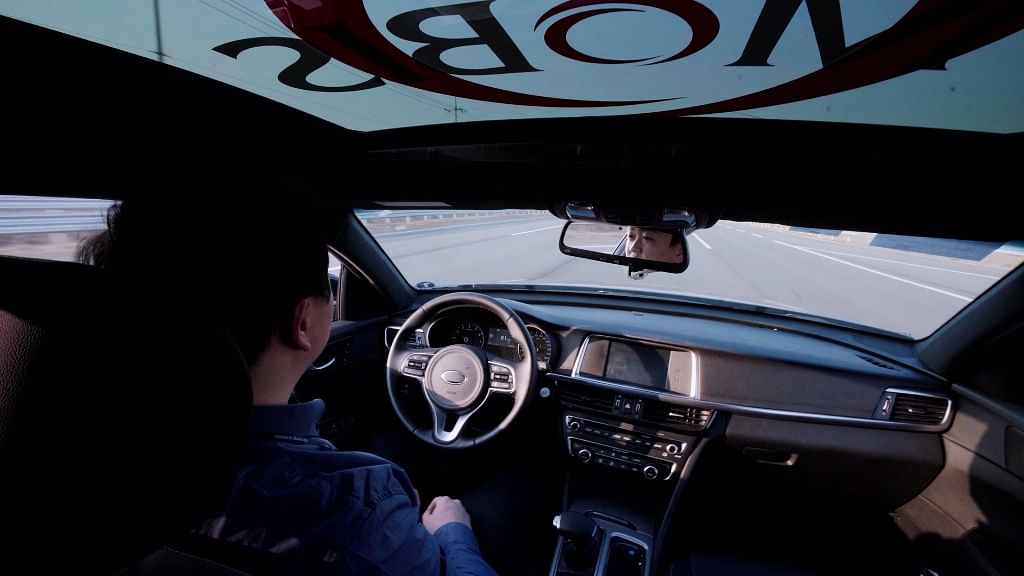Hyundai Mobis's M.Billy to be tested around the world
Hyundai Mobis takes its first step towards autonomous mobility. They aim to showcase a technology that complies with all the global regulations on autonomy.
Hyundai Mobis begins level-3 autonomous driving test of M.Billy in the US. It aims to start the mass production of the level-3 system equipped with its originally developed sensors, including radar, camera and lidar by 2022.
Hyundai Mobis, a Seoul-based automotive supplier, kicked off testing of its autonomous car M.Billy on the roads around the world. The company now has three test cars but will increase the number to over ten by the end of this year and increase engineers in the autonomous driving field by up to more than 15% every year for developing a safe autonomous driving technology.
Hyundai Mobis announced that it will test its autonomous car model M.Billy in Michigan, the U.S., from the middle of this month for level 3 and level 4 autonomous driving system development. Level 3 is conditional automation, which requires driver involvement in certain circumstances, while level 4 means high automation without driver intervention.
The name M.Billy is taken from the word ‘mobility’ from the technology development vision of Hyundai Mobis, ‘New Mobility Experience’. The test car is a Kia K5 (Optima) embedded with an autonomous driving system.
To conduct pilots and test the safety of an autonomous driving test car, the test will first take place on the proving ground (test track) very similar to public roads and real-world driving tests will follow afterwards. In 2016, Hyundai Mobis registered a special license plate (M-plate) for autonomous driving test car from the government of Michigan.

Hyundai Mobis will test M.Billy in the U.S., Korea and Germany. The company will obtain a test license for autonomous driving in Korea next month, and in Germany in June. Once the license is issued, M.Billy will undergo the same functionality and safety tests as in the U.S. and take a driving test on public roads in both Korea and Germany.
Each country has its own regulations on testing of the autonomous vehicle. Germany adopted a law that sets a legal framework for autonomous driving cars in June and it requires cars with an autonomous driving system to be equipped with a black box to record the journey underway.
"We now have a total of three M.Billys, one in each region and we will soon have over ten M.Billys, which is enough for a large-scale pilot. We aim to mass produce level-3 highly automated driving system equipped with our original sensors by 2022,” Hyundai Mobis ADAS Director Hwang Jae-ho said.
The autonomous driving test car will be equipped with sensors originally developed by Hyundai Mobis. There will be eight different types of sensors including front-view camera (1), radar (5), lidar (1), ultrasonic sensor (12), surround view monitoring (SVM, 4) and total of 25 sensors. At the moment, M.Billy only has front-view radar developed by Hyundai Mobis but the company assures that the rest will be installed from the third quarter of this year in line with the development schedule.
The quality of the autonomous driving system is determined by its capability of securing the safety of not only the driver but also passenger and other vehicles on the road, which should be demonstrated in order to ensure that a vehicle equipped with the autonomous driving system provided by Hyundai Mobis is readily marketable. This requires a database of different driving conditions and environments. This data enables the development of technologies essential for safe autonomous driving through the modification and upgrade of old systems, and improvement of sensor accuracy.
Hyundai Mobis plans to increase R&D investment to 10% of auto components sales by 2021 in order to make a more concentrated effort on developing the core technologies for future vehicles. Nearly 50% of all R&D investment will be devoted to the study of ICT, including sensors for autonomous driving. The company has 600 autonomous driving researchers, and they claim a rise of 15% every year.
Representatives at Hyundai Mobis told Autocar Professional, “We operate a tech centre in Hyderabad, and we hope to obtain an autonomous driving licence in India in the near future.”
RELATED ARTICLES
Autoliv Plans JV for Advanced Safety Electronics With China’s HSAE
The new joint venture, which is to be located strategically near Shanghai and close to several existing Autoliv sites in...
JLR to Restart Production Over a Month After September Hacking
Manufacturing operations at the Tata Group-owned British luxury car and SUV manufacturer were shut down following a cybe...
BYD UK Sales Jump 880% in September to 11,271 units
Sales record sets the UK apart as the largest international market for BYD outside of China for the first time. The Seal...






 By Autocar Professional Bureau
By Autocar Professional Bureau
 23 Apr 2018
23 Apr 2018
 7332 Views
7332 Views





 Ajit Dalvi
Ajit Dalvi




